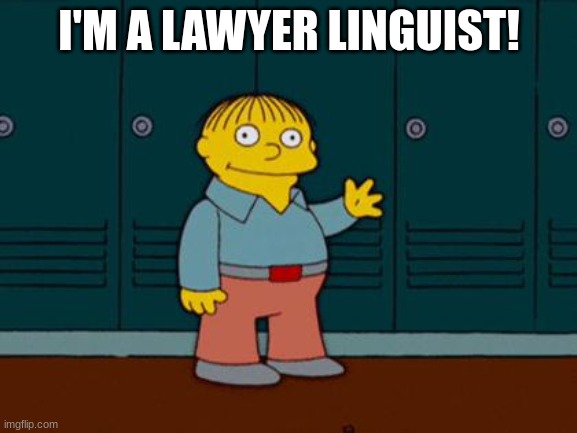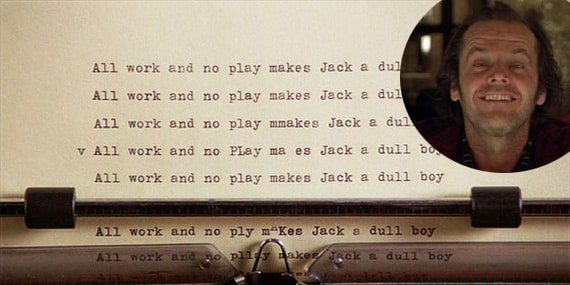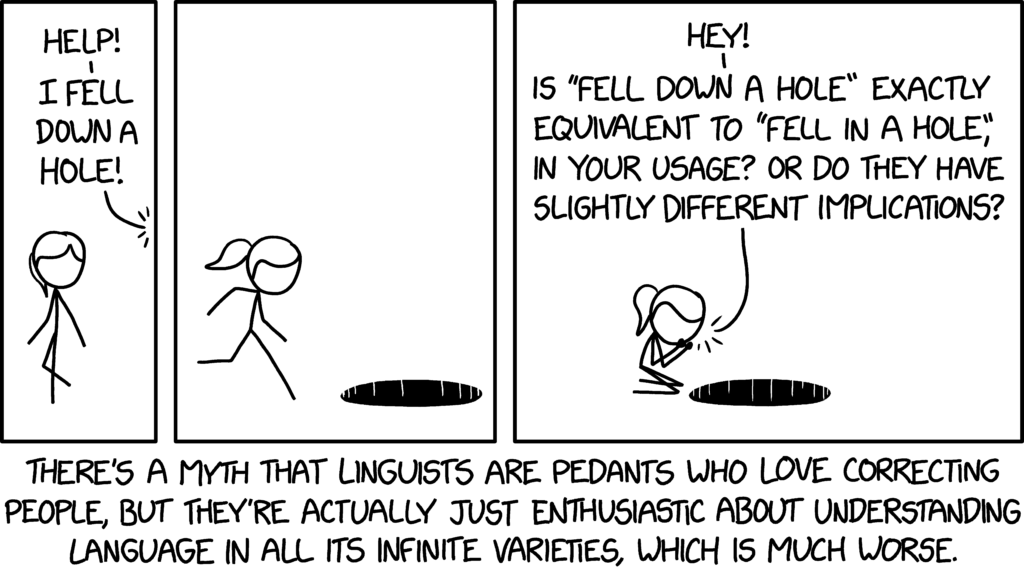Posted by Stephen Horowitz, Lecturer of Legal English
Fun with punctuation. (via social media)


Post by Profs. Stephen Horowitz and John Dundon, Georgetown Legal English Lecturers
Despite teaching the same Two-Year LLM program Legal English course the past three years (same content, different sections), my esteemed colleague Prof. John Dundon and I just realized we differ on whether, when focusing on the line of criminal procedure cases and Miranda rights during our Legal English II course, the correct version of the phrase should generally be plural (i.e., Miranda warnings), or whether it is also acceptable for it to be singular (i.e., Miranda warning.)
I won’t say who was advocating for which side, but the argument for exclusively plural was that the Miranda v. Arizona opinion includes multiple items for which a warning must be provided, including the right to remain silent and the right to an attorney. The argument against was that the multiple items can be viewed collectively as one warning.
The only civilized way to settle this debate between two lawyer-linguists, of course, was to follow the descriptivist path of looking to the corpora.
Using the entire internet as a corpus (i.e., a Google search of the phrase “a Miranda warning”), it seems to support the use of the singular, as the phrase appears in the Wikipedia entry for Miranda Rights as well as in news articles (e.g., NPR; NYTimes), on legal info sites (e.g., Cornell Law School Legal Information Institute; usconstitution.net; NOLO.com), and on law firm sites (e.g., D’Emilia Law – “What is a Miranda Warning.”)
So do those arguing for the exclusive preference for the plural have the right to remain silent? Not without first consulting an attorney. In fact, nine of them.
If the corpus is instead the line of Miranda cases from our course, all of which were decided by the U.S. Supreme Court–the esteemed body that originated Miranda rights and its associated language–then suddenly we see an extremely strong predilection for the view that Miranda is actually comprised of several warnings, which suggests that the plural may in fact be correct. And the singular version is then just a vulgar mutation that has been adopted by the masses. (Or, stated more objectively, a variation that has been adopted in less specialized settings.)
So what’s a lawyer-linguist legal English teacher working with Miranda cases to tell their students? Our takeaway is to just share this blog post with them so they recognize that the appropriate form–single or plural–likely depends on the context and the audience.
If you’re writing a brief for the court or you’re a judge writing an opinion or perhaps a law professor writing a law journal article, then plural seems the preferred option. But if you’re writing a news article or a client email or having a cocktail party conversation, then singular is would seem to be just fine.
If you disagree with us, then you have the right to consult with an attorney-linguist. And if you cannot afford one, then we will be happy to provide you with one of course.

Post by Stephen Horowitz, Professor of Legal English
In the second semester of our Legal English course at Georgetown Law in the Two-Year LLM Program, we focus on criminal procedure cases. More specifically, Miranda rights including the concepts of custody and interrogation.
This Saturday Night Live comedy sketch seems to be a unique example that somehow sits at the intersection of criminal procedure, language learning, and humor, parodying the way many of us “learned” Spanish in school growing up in the US. And really, parodying the way many of us learned any language in school growing up. Enjoy!
Post by Stephen Horowitz, Professor of Legal English
Another bit of great perspective on English by Finnish comedian ISMO. This one on all the wonderful silent letters one encounters when trying to function in English. Something I’m sure all of my 2-Year LLM Program students will appreciate.
And if you missed it, check out this previous post with another clip from ISMO on how “ass” is the most complicated word in the English language.
Post by Prof. Stephen Horowitz, Legal English Lecturer
I recently learned of the Finnish comedian Ismo who I now believe to be one of the great commenters on the English language, and in ways that I imagine are both helpful and entertaining for non-native English speakers.
In this clip below he offers insights on the language of American greetings, offers of help, and the wide range of potential meanings for the word “ass.” I have not yet had a chance to share this with my students, but I will at some point.
Ismo also has a terrific bit on what he considers to be the hardest word in the English language: “I didn’t know shit“

My other favorite comedy and language bit is by Jerry Seinfeld on the topic of prepositions. But unfortunately, it doesn’t seem to be available on the internet.
In it, he observes that we ride “in” a car but “on” a train. And if you go to Manhattan you’re “in” Manhattan. But if you to to Long Island, you’re “on the Island.”
And what do you do with Uber? Well, you “take” an Uber.
It’s also a great clip to share with students because, unlike a lot of other American stand-up comedy, it’s easily understandable for non-native English speakers.
If any readers ever find a link for this bit, I would greatly appreciate if it could be shared with me.

By my friend and New Yorker cartoonist Paul Noth. I think foreign-educated lawyers in Georgetown’s Tax LLM program as well as those students thinking of applying to a tax LLM program (not to mention anyone who pays taxes in the US) might appreciate this.

Happy April Fool’s Day!

As you hopefully now realize, there is no “Final Case Assignment” for the Legal English II class. This is all part of a semi-elaborate April Fool’s Day prank. 🙂
For readers not in my Legal English II class, here’s the email that was sent to my students today:
Hi everyone,
Our sincere apologies but there’s one additional Crim Pro case assignment we neglected to include in the syllabus and which needs to be completed before Monday.
Here’s a link to the:
1. Final case assignment instructions
2. Final case
Again, our apologies for the late notice.
Professor Horowitz
ps Have fun with it!
BONUS Part 1: My own greatest and worst April Fool’s Day prank was my senior year in college. I was taking a large-lecture European History class. And in addition to the weekly lecture, we also met once a week in small sections with a Teaching Assistant. For one assignment, we had to write a 3 to 5 page paper, and I realized it was due on April 1.
So after I finished writing my paper, I also wrote an alternative version of my paper. Except it was just 4 pages of the text “All work and no play makes Jack a dull boy” repeated over and over again. And if you’re not familiar with the horror movie The Shining, there’s a climactic scene where an author is going mad and his wife goes into his office and looks at all of the pages he’s been typing for weeks, and she realizes they all have that phrase over and over and over. Very chilling!

Anyway, back to the story, I went in to the history department office, found my Teaching Assistant’s in-box (amidst a wall of many Teaching Assistant in-boxes), and then put the alternative paper at the top of the pile and my real paper at the bottom.
The following week in our small section, I brought a couple extra copies of the real paper just in case anything went wrong. And it definitely did.
At the end of class, my Teaching Assistant approached me tentatively and said, “Um…Professor Hunt would like to meet with you.” I said, “Is this about the paper?” And he said, “Um…you better just go talk with Professor Hunt.”
I walked across campus to Professor Hunt’s office, and the Teaching Assistant followed behind me. I went into Professor Hunt’s office, and I asked, “Is this about the paper?” And she said, “Yes.” I said, “You know that’s from The Shining, right?” And she said, “Yes. That’s why everyone was worried. We had a big meeting about this and discussed whether this was a threat.”
I said, “It was meant to be an April Fool’s joke. I put my real paper in the TA’s in-box.” And I looked at my TA and he uncomfortably shook his head and replied, “I didn’t see it there.” And I thought, “Oh crap. This isn’t going well.”
I then pulled out one of my extra copies of the paper and said, “See, I really did write the paper. Here’s a copy!” And Professor Hunt replied, “Oh, you just happen to have a copy of the paper now?” And I thought, “This is really not going well.”
But somehow I was able to persuade her and the Teaching Assistant that I did not create this elaborate prank just to buy extra time to write the paper. I was a senior, I wasn’t worried about my grade, and I this was not a difficult paper to write. So there was no bigger agenda.
Finally they decided they could trust me and I walked out of the office and across campus picturing what the meeting and discussion with the professor and all the Teaching Assistants must have been like. I felt terrible. But then I also thought, “Well, at least they’ll always remember me!: 🙂
BONUS Part 2: One of the greatest April Fool’s Day jokes ever in American modern history was in 1985 when Sports Illustrated magazine published an article about an amazing baseball player named Sidd Finch who no one had really heard of but who could throw faster than any player ever had. This was pre-internet and most people didn’t realize for at least a week or two that it was an April Fool’s joke.
And the only real clue was in the sub-heading of the article–“He’s a pitcher, part yogi and part recluse. Impressively liberated from our opulent life-style, Sidd’s deciding about yoga—and his future in baseball.” The first letter of each word in that sub-heading spells out: “Happy April Fool’s Day — a(h) fib.”


Stephen Horowitz is the Director of Online Legal English Programs at Georgetown Law.
Thank you to ETLEP Group member Nigel Bruce, Principal Language Consultant at Hong Kong Shue Yan University, for sharing this tongue-in-cheek video of how linguists (whoda thunkit!) will save as from the pandemic by focusing on plosives.

Stephen Horowitz is the Director of Online Legal English Programs at Georgetown Law.
From 11/25/20 xkcd (“A webcomic of romance, sarcasm, math and language”)

And go to the Language Log blog (which is where I first aw this xkcd webcomic) for some great linguist commentary and reactions to this.
Ever since reading this webcomic, my life ambition has become to put it on a coffee mug and give the mugs out to everyone else at the law school outside of the Legal English Team to help shift the perception of the ways we help LLM students and other non-native English speaking law students.
When I dream, I dream big.